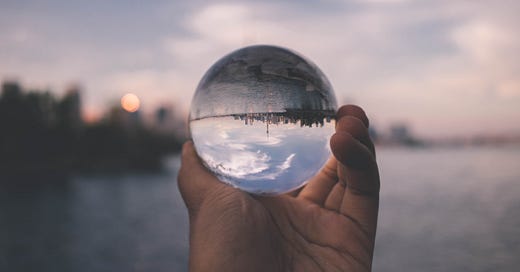All we have is how we see the world
Speaking about the future of creativity at Advertising Week Europe, Nils Leonard said "all we have is how we see the world". He's so right, and here's why.
I keep listening to the wind of change in conversations with colleagues and clients. People are cautiously preparing for a Labour government, saying "if, as seems increasingly likely, we see a change of government at the next election". The recent local elections only fuelled this narrative further.
I'm in the "anyone but the Tories" camp, and Keir Starmer seems like a nice enough chap who ticks all the boxes to make him a palatable PM. But, to misquote the late Nikki Graham, "who IS he?".
He seems vanilla, lacking solid opinions about anything except that the Tories are wrong. He’s so bland and well media trained that he could be a Premier League footballer.
I worry that he's a candidate coming ten years too late. We live in an era of hot takes and strong opinions, fiercely held and, if necessary, fought to the bitter end over. Policies are out; your views on how many asterisks should be attached to Man City's (potential) treble are in.
The same applies in marketing and communications, even if the arguments and hot takes are less spicy than in the political arena.
I went to Advertising Week Europe (let's call it Adweek for ease), and too many of the sessions I attended were a bit Keir Starmer. Nice enough, but lacking in solid, well-reasoned opinions.
There was a particular panel format most guilty of this. It tended to feature a CMO or senior marketer from a big brand, accompanied by a bigwig from their agency, alongside a senior salesperson from their preferred platform of choice. Meta, plus P&G or Google with BT and EssenceMediacom.
If you're starting in your career or lack access to big brand setups, this kind of session probably has plenty of value. For me, it felt like a lot of backslapping alongside an unsubtle sales pitch. It's not what I go to events like Adweek for.
I'm here to hear what you think and to hear the benefits of your experience - and that includes the bad experiences too. We learn far more from our failures than we do from our successes.
The team working on the Cadbury account at VCCP did a great job of sharing those and being honest about the difficult conversations the ECD had with the client on what the final "there's a glass and a half in everyone" execution should look like.
Or Mary Portas telling the crowd how she risked getting fired from Harvey Nichols by disrupting the traditional "f**k off big Christmas store display". Mary instead chose to let the front windows stand empty, donating the money she would have spent on celebrities and artists to charities.
These experiences and candid, honest assessments of past work are valuable because they expose us to different ways of approaching client briefs and challenges. I've been in this game for 15 years and am sometimes guilty of defaulting to what's worked before when under the pressure. Exposure to other people's experiences can help shake us out of those fixed mental pathways, providing a shock to the system and making us think differently. The simultaneously exciting and frustrating thing about working in marketing and communications is there's no one "right way" of doing things.
That's especially true of planning and creative (you're better off not messing TOO much with best practice when it comes to execution. But there are rules to break there too). No two briefs are the same (and if they are, I'd ask for a new brief). You'll undoubtedly have, as I do, some habits and mental frameworks you fall back on to get yourself started. But the joy of exploring the brief is partly about letting go and seeing where the journey takes you.
And YOU, YOU'RE the key figure in that journey. The unique perspective YOU bring to a process is your superpower.
As Nils Leonard said during a debate on "the golden age of advertising", "all we have is how we see the world". That's what makes us stand out, either as individuals or as individual agencies.
We might all have access to the same data, tools and reports, but what we do with that information counts. Five agencies might get the same brief, but they can all interpret it differently and bring their unique perspective to bear. At Teneo, we only enter a room with clients if we have strong, well-informed and well-reasoned opinions on their business and reputational challenges.
Not sharing those strong, well-reasoned opinions does us a disservice - relying on bland platitudes and cookie-cutter responses ("The velocity at which we're consuming a multitude of content across channels requires strong, clear brand communications." - no shit) is the Keir Starmer/Premier League footballer approach to talking about our work. At events like Advertising Week and in our work, we need to be less Premier League and more Women's Super League, more Lioness.
The Lionesses winning Euro 2022 was refreshing for many reasons, not least how open and honest the team were when handling their media duties. That's their superpower (besides being excellent at football), and we can all use more of their honesty and confidence in our responses.
In a world where many of us will soon use generative AI tools in our day-to-day work, "how we see the world" will make us stand out. Take the time to work out your viewpoint, basing it on evidence and experience, and then have the confidence to share it with the world. Your perspective might not be for everyone, but (to use a footballer cliche) at the end of the day, if you’re for everyone, you’re for no one. Lean into your opinions and harness them as your superpower.





